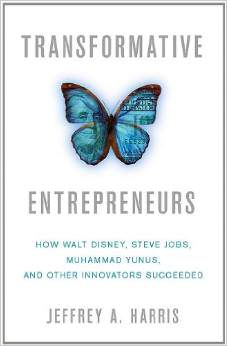8 Ways to Transform a Market
Every entrepreneur has an idea for transforming a market with innovative new technology or transforming society with a new process. But unfortunately, most of these ideas fail at the execution level or are not truly innovative. Entrepreneurs who have been really transformative, like Steve Jobs and Walt Disney, seemed to know how to deal with all the right elements.
Jeffrey A. Harris, in his new book “Transformative Entrepreneurs,” provides examples of key elements of transformative ideas and leadership abilities that separate the winners from the losers. I found his observations, like the following, to be inspirational for those of us chasing an entrepreneurial dream:
- It’s all about the people. Ideas have to be implemented well to change a market or the world. Good implementation requires a plan, and a great plan and great operational decisions come from great people. That’s why investors look for entrepreneurs who have true grit, dogged persistence, and a disdain for the status quo.
- Seek innovation that begets invention. It doesn’t always work the other way around. According to a recent MIT study, only about 10% of patents granted in the United States have any meaningful commercial importance and less than one percent are of seminal importance. True business titans deliver both invention and innovation.
- Find enough venturesome capital. Nearly all new businesses aspiring to reach meaningful scale require some sort of outside funding to finance a competitive growth trajectory. The objective must be to get sufficient capital, with experienced and motivated counsel, to make the venture succeed.
- Create a formidable and durable business model. Your business model is your value proposition. “Free” sounds like a great model, but it doesn’t imply value. Look for customer-focused value creation. Make your business model your competitive differentiation, like Fred Smith with Federal Express, or Ingvar Kamprad with IKEA.
- Grab the next-mover advantage. First-movers have an initial advantage, but this position is fraught with risk, and often comes with a high price. Herb Kelleher, who started Southwest Airlines, wasn’t the first in the airline business, but he saw the need for low-cost short hauls, with exemplary customer service, and transformed the industry.
- Failure is an option. Building a business from a raw start is hard, risky work. That means that the process of innovation is not always pretty and rarely successful. The best entrepreneurs always regroup after a failure, learn from prior mistakes, persevere, and launch a new venture with considerably improved odds of success.
- Government matters. Government policies, initiatives, and leadership set the stage for economic growth, and provide resources for improving living standards, and enabling technological advantage. Transformative entrepreneurs pay attention and capitalize on these cues, rather than ignore or fight them.
- Innovate or die. In a world connected through a broadband Internet and mushrooming social networks, information flows quickly and relatively seamlessly, expediting the pace at which new innovations gain traction and speed. Standing still is tantamount to giving up. It is not an option.
These elements and the people stories in the Harris book highlight just how difficult it is to build a truly transformative business, yet at the same time illustrate that it can be done, and has been done many times, with no correlation to geographic, ethnic, age, or sexual boundaries.
In fact, I’m convinced that it needs to happen more often, with all the challenges we have in our modern world. So it’s up to each of you to assess your activities, and your potential, to be transformative. Being there has to be a lot more satisfying than most of the professional feedback I hear about today.

